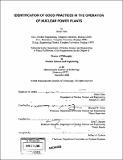| dc.contributor.advisor | Michael W. Golay. | en_US |
| dc.contributor.author | Chen, Haibo, 1975- | en_US |
| dc.contributor.other | Massachusetts Institute of Technology. Dept. of Nuclear Engineering. | en_US |
| dc.date.accessioned | 2006-11-07T12:07:57Z | |
| dc.date.available | 2006-11-07T12:07:57Z | |
| dc.date.copyright | 2004 | en_US |
| dc.date.issued | 2005 | en_US |
| dc.identifier.uri | http://hdl.handle.net/1721.1/34431 | |
| dc.description | Thesis (Ph. D.)--Massachusetts Institute of Technology, Dept. of Nuclear Engineering, February 2005. | en_US |
| dc.description | Includes bibliographical references (leaf 102). | en_US |
| dc.description.abstract | This work developed an approach to diagnose problems and identify good practices in the operation of nuclear power plants using the system dynamics technique. The research began with construction of the ORSIM (Nuclear Power Plant Operations and Risk Simulator) model, with its operational component modified from an existing model, and its risk component newly created in this research. A matrix of high-level performance indices was also created to measure plant performance as a function of continuous operation. The research continued with development of an interface program to provide a user-friendly environment, and then culminated with a report of the results obtained from a pilot project, and a demonstration of using ORSIM to investigate EPRI (Electric Power Research Institute) good practices. Both problem diagnosis and policy investigations were conducted in the pilot project. It was found that the performance matrix developed in this work was able to measure stability, reliability, and economic performance in a concise and clear manner. With this matrix, ORSIM was able to pinpoint bottlenecks of current operations and to project into the future what would be the implications of various policy changes. | en_US |
| dc.description.abstract | (cont.) It was also found that the tracking capability of ORSIM makes it easy to locate the root causes of problems and aids in identifying places where operational improvements might be implemented. In the EPRI good practices investigation, it was demonstrated that ORSIM is a good tool that assists plant managers in evaluating the benefits and risks of applying new practices. The pilot project and EPRI practices study showed that ORSIM is a good tool for plant managers to identify potential problems and to better understand the implications of their policy changes. It therefore can help improve the quality of decision-making and help achieve more stable, reliable, and economic operations of nuclear power plants. | en_US |
| dc.description.statementofresponsibility | by Haibo Chen. | en_US |
| dc.format.extent | 102 leaves | en_US |
| dc.format.extent | 6633046 bytes | |
| dc.format.extent | 6637825 bytes | |
| dc.format.mimetype | application/pdf | |
| dc.format.mimetype | application/pdf | |
| dc.language.iso | eng | en_US |
| dc.publisher | Massachusetts Institute of Technology | en_US |
| dc.rights | M.I.T. theses are protected by copyright. They may be viewed from this source for any purpose, but reproduction or distribution in any format is prohibited without written permission. See provided URL for inquiries about permission. | en_US |
| dc.rights.uri | http://dspace.mit.edu/handle/1721.1/7582 | |
| dc.subject | Nuclear Engineering. | en_US |
| dc.title | Identification of good practices in the operation of nuclear power plants | en_US |
| dc.type | Thesis | en_US |
| dc.description.degree | Ph.D. | en_US |
| dc.contributor.department | Massachusetts Institute of Technology. Department of Nuclear Engineering | en_US |
| dc.contributor.department | Massachusetts Institute of Technology. Department of Nuclear Science and Engineering | |
| dc.identifier.oclc | 70683829 | en_US |

